 Commonwealth Numbered Regulations
Commonwealth Numbered Regulations Commonwealth Numbered Regulations
Commonwealth Numbered Regulations[1] Rule 1.05, after note 2
insert
Note 3 Subsections 60I (2) and (12) of the Act require that a party comply with rule 1.05 and Part 2 of Schedule 1 of these Rules before an application is made for a parenting order.
[2] Chapter 2, summary
substitute
Summary of Chapter 2
Chapter 2 sets out rules about:
* the form of application you must file to start a case in a court;
* the documents you must file with an application; and
* the brochures that must be served in a case.
Before starting a case, you must comply with the court's pre‑action procedures (see subrule 1.05 (1) and Schedule 1).
The rules in Chapter 1 relating to the court's general powers apply in all cases and override all other provisions in these Rules.
A word or expression used in this Chapter may be defined in the dictionary at the end of these Rules.
[3] Rule 2.03
substitute
A person who files an Application for Final Orders (Form 1) or an Application for Divorce (Form 3) must, when serving the application on the respondent, also serve a brochure prepared by the court for section 12F of the Act.
Note In addition to the requirements of this rule, an applicant who has filed a Maintenance Application, child support application or appeal, or an Application for an Enforcement Hearing must serve the relevant brochure on the respondent (see rule 4.13 and subrules 4.23 (2) and 20.11 (3)).
[4] After Part 2.3 heading
insert
Division 2.3.1 Cases involving allegation of abuse or family violence in relation to a child
[5] Rule 2.04
substitute
2.04 Definition
In this Division:
allegation of abuse or family violence means an allegation:
(a) that a child has been abused or that there is a risk of a child being abused; or
(b) that there has been family violence involving a child or a member of the child's family or that there is a risk of family violence involving a child or a member of the child's family.
"Part VII order" has the same meaning as in subsection 60I (1) of the Act.
2.04A Application of Division 2.3.1
This Division applies to a case if an application is made to a court for a Part VII order in relation to a child in the case.
2.04B Filing and service
(1) In a case to which this Division applies, if any of the following persons makes an allegation of abuse or family violence the person must file a Notice of Child Abuse or Family Violence (Form 4):
(a) a party in the case;
(b) an independent children's lawyer in the case;
(c) a person seeking to intervene in the case.
(2) A person who files a Form 4 must file an affidavit or affidavits setting out the evidence on which the allegations in the Form 4 are based, no later than the time the Form 4 is filed.
Note The requirements for service of filed documents are set out in rule 7.04. For service of a notice filed in a case to which section 67Z of the Act applies, subsection 67Z (2) specifically requires that a person alleged in the notice to have abused a child in the case, or to be a person from whom a child in the case is at risk of being abused, must be served with a copy of the notice.
2.04C Listing case
If a Form 4 has been filed in a case, a Registrar may list the case for hearing or procedural hearing.
2.04D Prescribed document and prescribed form
A Notice of Child Abuse or Family Violence (Form 4) is:
(a) the document prescribed for the purposes of paragraph 60K (1) (d) of the Act; and
(b) the prescribed form for the purposes of a notice mentioned in subsection 67Z (2) of the Act.
[6] Before rule 2.06
insert
Division 2.3.2 Property settlement or spousal maintenance cases
[7] Rule 3.01, note 2
omit
(see rule 2.03 and section 17 of the Act).
insert
(see rule 2.03).
[8] Rule 4.13, note 2
omit
brochures required to be served under subrule 2.03 (3).
insert
brochure required to be served under rule 2.03.
[9] Rule 4.23, note 1
omit
brochures required to be served under subrule 2.03 (3).
insert
brochure required to be served under rule 2.03.
[10] Paragraph 5.08 (a)
omit
section 68F
insert
section 60CC
[11] Rule 5.09, notes 2 and 3
substitute
Note 2 Rule 15.21 provides that a party must not, without the court's permission, request the issue of more than 3 subpoenas for the hearing of an Application in a Case (Form 2). However, an independent children's lawyer may request the issue of more than 3 subpoenas (see subrule 15.21 (2)).
[12] Rule 6.01, note
substitute
Note An independent children's lawyer is not a party to a case but must be treated as a party (see rule 8.02).
[13] Rule 7.01, note
omit
the brochure mentioned in subrule 2.03 (3);
insert
the brochure mentioned in rule 2.03;
[14] Chapter 8, summary
substitute
Summary of Chapter 8
Chapter 8 sets out rules about:
* the people who may be heard by the court and the requirements for their address for service;
* the appointment of an independent children's lawyer; and
* lawyer's conflict of interest and ceasing to act.
The rules in Chapter 1 relating to the court's general powers apply in all cases and override all other provisions in these Rules.
A word or expression used in this Chapter may be defined in the dictionary at the end of these Rules.
[15] Rule 8.02
substitute
8.02 Independent children's lawyer
(1) A party may apply for the appointment or removal of an independent children's lawyer by filing an Application in a Case (Form 2).
Note A party may ask for a procedural order orally (see paragraph (h) of item 3 of Table 11.1 in rule 11.01).
(2) If the court makes an order for the appointment of an independent children's lawyer:
(a) it may request that the representation be arranged by a legal aid body that is a relevant authority within the meaning of subsection 116C (5) of the Act; and
(b) it may order that the costs of the independent children's lawyer be met by a party.
Note Section 68L of the Act provides for the independent representation of children.
(3) A person appointed as an independent children's lawyer:
(a) must file a Notice of Address for Service (Form 8);
(b) must comply with these Rules and do anything required to be done by a party; and
(c) may do anything permitted by these Rules to be done by a party.
(4) If an independent children's lawyer is appointed, the parties must conduct the case as if the independent children's lawyer were a party.
(5) The appointment of an independent children's lawyer ceases:
(a) when the Application for Final Orders (Form 1) is determined or withdrawn; or
(b) if there is an appeal -- when the appeal is determined or withdrawn.
Note 1 If a document or notice is served on or given to a party under these Rules, the document or notice must also be served on or given to any independent children's lawyer (see subrule 7.04 (4)).
Note 2 This rule applies unless the court orders otherwise (see rule 1.12).
[16] Subrule 10.15 (4), note
substitute
Note If an independent children's lawyer has been appointed in a case, the court will not make a consent order unless the independent children's lawyer has also signed the draft consent order (see subrule 8.02 (4)).
[17] Rule 11.01, Table 11.1, item 1
substitute
|
1 |
Attendance |
(a) order a party to attend: (i) an information session; (ii) a procedural hearing; (iii) a family consultant; (iv) family counselling or family dispute resolution; |
|
|
|
(v) a conference or other court event; or (vi) a post‑separation parenting program; (b) require a party, a party's lawyer or an independent children's lawyer to attend court |
[18] Chapter 12, summary
substitute
Summary of Chapter 12
Chapter 12 sets out rules about the events that parties to an Application for Final Orders (Form 1) may be required to attend during the course of the case. These include a case assessment conference, a procedural hearing, family counselling, family dispute resolution, attendance with a family consultant, a conciliation conference, a pre‑trial conference and a trial. Rules about the events in the determination phase of a case to which Chapter 16A applies are set out in Chapter 16A.
The rules in Chapter 1 relating to the court's general powers apply in all cases and override all other provisions in these Rules.
A word or expression used in this Chapter may be defined in the dictionary at the end of these Rules.
[19] Chapter 12, flowchart
substitute
|
|
|
Comply with pre‑action procedures |
|
||||||||
|
|
|
||||||||||
|
|
Start of case (Chapter 2) |
||||||||||
|
|
|
||||||||||
|
|
First court date (hearing, procedural hearing, case assessment conference) |
||||||||||
|
|
|
|
|
||||||||
|
|
Property |
|
Parenting order |
||||||||
|
|
|
|
|
||||||||
|
|
Conciliation conference |
Final resolution event |
Attendance with family consultant |
||||||||
|
|
|
|
|
|
|||||||
|
|
|
Trial notice issues |
|
||||||||
|
|
|
||||||||||
|
|
Pre‑trial conference |
|
|||||||||
|
|
|
||||||||||
|
|
|
||||||||||
|
|
Trial |
|
|||||||||
[20] Subrule 12.03 (1)
substitute
(1) A case assessment conference must be held in the presence of:
(a) a Registrar; or
(b) a family consultant.
[21] Subrule 12.04 (1), note 1
omit
mediation in a parenting case,
insert
family counselling or family dispute resolution in a parenting case,
[22] Subrule 12.06 (1)
omit
a mediator.
insert
a family consultant.
[23] Subrule 15.02 (2)
substitute
(2) The interview may be conducted in the presence of a family consultant or another person specified by the judicial officer.
[24] Rule 15.04
omit
[25] Rule 15.30
substitute
15.30 Right to inspect and copy
(1) This rule applies if:
(a) the issuing party serves the named person and the other parties, including the independent children's lawyer (if any), in accordance with rule 15.28 at least 21 days before the court date; and
(b) the named person complies with the subpoena at least 7 days before the court date.
(2) The written notice mentioned in subparagraph 15.28 (1) (a) (iii) must state that:
(a) if the named person:
(i) complies with the subpoena at least 7 days before the court date; and
(ii) does not object to a party or any independent children's lawyer inspecting or copying the document; and
(b) if no other party or person objects to the document being inspected and copied by the parties or any independent children's lawyer;
each party and any independent children's lawyer is entitled, without an order, to inspect and take copies of the document from 7 days before the court date.
(3) The issuing party must file an Affidavit of Service (Form 7), setting out the details of the party's compliance with paragraph (1) (a).
(4) If the named person, a party or an independent children's lawyer has not made an objection under rule 15.31 by the seventh day before the court date, each party and any independent children's lawyer is entitled, after the seventh day and without an order, to inspect and take copies of the document.
Note Some legislative provisions prohibit government departments from communicating certain information; for example, see section 150 of the Assessment Act and section 16 of the Registration Act.
[26] Rule 15.41
omit
This Part (other than rule 15.55)
insert
(1) This Part (other than rule 15.55)
[27] Paragraph 15.41 (d)
omit
mediator
insert
family consultant
[28] Rule 15.41, after the example
insert
(2) Nothing in this Part prevents an independent children's lawyer communicating with a single expert witness.
[29] Subrule 15.44 (1), at the foot
insert
Note Subrule 15.54 (3) sets out the requirements that apply to instructions to a single expert witness appointed by agreement between the parties.
[30] After subrule 15.54 (2)
insert
(3) All instructions to a single expert witness appointed by agreement between the parties must be provided jointly by the parties and, if an independent children's lawyer has been appointed in the case, the independent children's lawyer.
[31] Subrule 16A.10 (1)
omit
mediator,
insert
family consultant,
[32] Paragraph 18.02 (1) (b)
omit
section 19G
insert
section 13K
[33] Paragraph 18.02 (1) (d)
omit
section 70NL
insert
section 70NFD
[34] Paragraph 18.02 (1) (d)
omit
paragraph 70NJ (3) (a)
insert
paragraph 70NFB (2) (a)
[35] Rule 18.05, Table 18.2, items 4 and 5
substitute
|
4 |
paragraph 65G (2) (b) |
Power to make a parenting order by consent in favour of a non‑parent without attendance at conference with a family consultant |
|
5 |
section 65L |
Power to make an order requiring compliance with a parenting order to be supervised by a family consultant |
[36] Rule 18.05, Table 18.2, item 14
substitute
|
14 |
subsection 68M (2) |
Power to make an order that a child be made available for an examination for the purposes of preparing a report in connection with the proceedings |
[37] Subrule 18.06 (1), Table 18.4
substitute
Table 18.4 Powers delegated to Deputy Registrars
|
Item |
Legislative provision |
Description (for information only) |
|
Family Law Act |
||
|
1 |
section 11F |
Power to order parties to attend appointment or a series of appointments with a family consultant |
|
2 |
section 11G |
Power to make an order as a result of failure to attend appointment with family consultant |
|
3 |
section 13B |
Power to refer parties to family counselling and to adjourn the case until the parties have had family counselling |
|
4 |
section 13C |
Power to refer parties to family counselling, family dispute resolution and other family services and to adjourn the case until the parties have had family counselling, family dispute resolution and other family services |
|
5 |
section 13D |
Power to make an order as a result of failure to attend family counselling, family dispute resolution or other family services |
|
6 |
sections 13E and 13F |
Power to refer parties to arbitration, with consent of parties, and to make procedural orders to assist arbitration |
|
section 27A |
Power to direct, at any stage, that a case or part of a case be conducted or continued at a specified place subject to conditions (if any) |
|
|
8 |
sections 33B and 33C |
Power to transfer a case, in whole or in part, to the Federal Magistrates Court |
|
9 |
subsection 37A (1) (except subparagraph (e) (iv) and paragraph (f)) |
Power to make procedural and costs orders Note The delegations mentioned in this item are subject to the restrictions imposed by subsection 37A (6) of the Act. |
|
10 |
subsection 44 (1C) |
Power to make an order for divorce within 2 years of the date of marriage |
|
11 |
section 45 |
Power to transfer a case to another court |
|
12 |
section 48 |
Power to make a divorce order in an undefended case |
|
13 |
subsection 55 (2) |
Power to reduce or increase the time for a divorce order to take effect |
|
14 |
section 55A |
Power to make a declaration about arrangements for children after a divorce |
|
15 |
section 57 |
Power to rescind a divorce order if parties reconciled |
|
16 |
paragraphs 60K (2) (a), (b) and (c) |
Power to make procedural orders in relation to allegations of child abuse or family violence |
|
17 |
section 62G |
Power to order a family report |
|
18 |
subsection 63E (3) |
Power to register a revocation agreement |
|
19 |
section 68L |
Power to make an order that a child is to be independently represented |
|
20 |
section 69ZW |
Power to make an order requesting a prescribed State or Territory agency to provide the court with specified documents or information |
|
21 |
paragraph 79 (9) (c) |
Power to make an order dispensing with requirement to attend a conference |
|
22 |
subsection 91B (1) |
Power to request that a prescribed child welfare authority intervene in a case in which a child's welfare is or may be affected |
|
23 |
subsections 92 (1) and (2) |
Power to make an order entitling a person to intervene in a case |
|
24 |
subsection 97 (1A) |
Power to exercise powers in chambers |
|
25 |
subsection 97 (2) |
Power to make an order that a specified person is not, or specified persons are not, to be present in court during the case or during a specified part of the case that is within the Deputy Registrar's power |
|
26 |
section 98A |
Power to make an order granting an undefended application for divorce in the absence of the parties |
|
27 |
section 101 |
Power to protect a witness in relation to a case being heard by the Deputy Registrar |
|
28 |
section 109A |
Power to enforce an order in relation to a financial matter |
|
29 |
subsection 114 (3) |
Power to grant an injunction in relation to an obligation to be enforced under Chapter 20 |
|
30 |
subsection 117 (2) (except an order as to security for costs) |
Power to make a costs order in a case before the Deputy Registrar |
|
Family Law Regulations |
||
|
31 |
subregulation 4 (1) |
Power to make an order in relation to practice and procedure if satisfied that the Act, the Regulations or these Rules do not adequately provide for a particular situation or there is a difficulty or doubt about practice or procedure |
|
32 |
regulation 5 |
Power to make an order in relation to a case if a party has not complied with the Regulations or these Rules |
|
33 |
paragraph 6 (1) (a) |
Power to relieve a party from non‑compliance with a regulation, rule or order made by a Registrar |
|
Bankruptcy Act |
||
|
34 |
section 33 |
Adjournment, amendment of process and extension and abridgment of times |
|
35 |
section 81 |
Powers in relation to examinations |
|
36 |
section 264B |
Power to issue a warrant |
|
37 |
subsection 309 (2) |
Power to order substituted service |
[38] Subrule 18.06 (2), Table 18.5, after item 31
insert
|
31A |
Rule 16A.04 |
Power to grant permission for a case to be dealt with under Division 12A of Part VII of the Act |
[39] Subrule 19.04 (7), definition of court event
substitute
"court event" does not include an attendance with a family counsellor, a family dispute resolution practitioner or a family consultant in a parenting case.
[40] Subparagraphs 20.01 (2) (a) (iii) to (vii)
substitute
(iii) an award made in arbitration and registered under section 13H of the Act;
(iv) a maintenance agreement registered under subsection 86 (1) of the Act;
(v) a maintenance agreement approved under section 87 of the Act;
(vi) a financial agreement or termination agreement under Part VIIIA of the Act;
(vii) an agreement varying or revoking an original agreement dealing with the maintenance of a child under section 66SA of the Act; or
(viii) an overseas maintenance order or agreement that, under the Regulations, is enforceable in Australia;
[41] Chapter 21, summary
substitute
Summary of Chapter 21
Chapter 21 sets out how a party may seek:
* an order to enforce a parenting order;
* an order that a person be punished for contravening an order, bond or sentence, or for contempt of court; or
* an order to locate or recover children.
Before filing an application, a party should consider the result that the party wants to achieve. The remedies available from the court range from the enforcement of a bond or order to the punishment of a person for failure to comply with an order, bond or sentence. For example, the court may make an order that:
* ensures the resumption of the arrangements set out in an earlier order;
* compensates a person for time lost with a child;
* compensates a person for expenses incurred in attempting to spend time with a child;
* varies an existing order;
* puts a person on notice that, if the person does not comply with an order, the person will be punished; or
* punishes a person by way of a fine or imprisonment.
Contempt of court should be alleged only if the conduct complained of is serious enough to warrant such a serious charge, for example, if it is alleged that the contravention of an order involves a flagrant challenge to the court's authority (see subsection 112AP (1) of the Act). A person found to be in contempt of the court may be imprisoned.
The rules in Chapter 1 relating to the court's general powers apply in all cases and override all other provisions in these Rules.
A word or expression used in this Chapter may be defined in the dictionary at the end of these Rules.
[42] Rule 21.01, note 3, subparagraph (a) (i)
omit
70NJ (6)
insert
70NFB (4)
[43] Rule 21.01, note 3, subparagraph (a) (ii)
omit
70NO (2)
insert
70NFG (2)
[44] Rule 21.02, Table 21.1, item 2
substitute
|
2 |
Contravention of an order (of a kind included in the definition of an order under this Act affecting children under section 70NB of the Act) under Division 13A of Part VII of the Act affecting children, for example, a breach of a parenting order |
Application -- Contravention (Form 18) |
[45] Rule 21.02, Table 21.1, example
substitute
Example for item 1 of Table 21 . 1
A party may use an Application in a Case (Form 2) if:
(a) the party does not want the other party to a parenting order to be punished for a failure to comply with the order but wants to be compensated for time not spent with a child as a result of the failure to comply; or
(b) before the time due to be spent with a child, the other party refuses to comply with the handover arrangements.
[46] Subrule 21.02 (2), example
omit
paragraph 70NJ (1) (c)
insert
paragraph 70NFA (2) (b)
[47] Rule 21.05, note
omit
counselling
insert
family counselling, family dispute resolution
[48] Rule 21.08, note
substitute
Note For the orders that may be made by the court, see sections 67X, 70NBA, 70NCB, 70NDB, 70NDC, 70NEB, 70NFB, 70NFF, 112AD, 112AH and 112AP of the Act.
[49] Subrule 21.09 (1)
substitute
(1) The provider of a post‑separation parenting program required to inform the court of a matter under section 70NED of the Act must do so by notice in accordance with subrule (2).
[50] Rule 21.10
omit
section 70NIA
insert
section 70NEG
[51] Rule 21.11, note
substitute
Note See sections 67J to 67W of the Act.
[52] Schedule 1, Part 1, paragraph 1 (1) (a)
omit
mediation,
[53] Schedule 1, Part 2, paragraph 1 (1) (a)
omit
mediation,
[54] Schedule 2, Forms 1 to 2
substitute








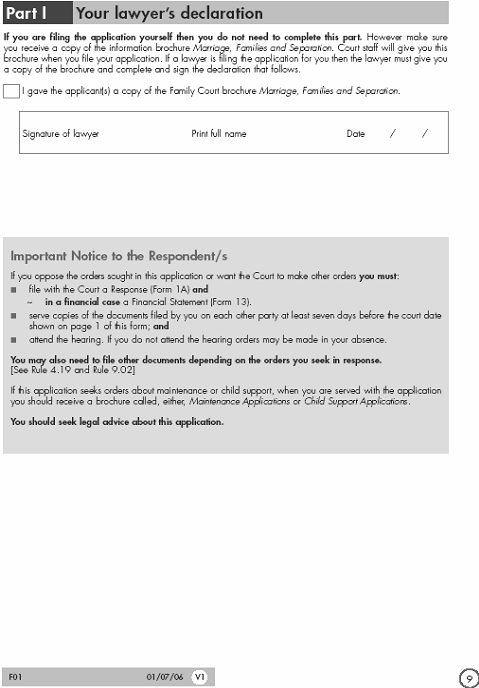















[55] Schedule 2, Form 3
substitute





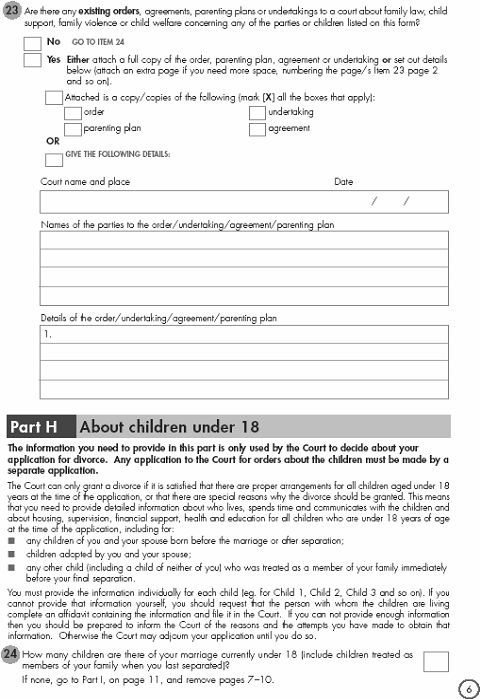







[56] Schedule 2, Form 4
substitute





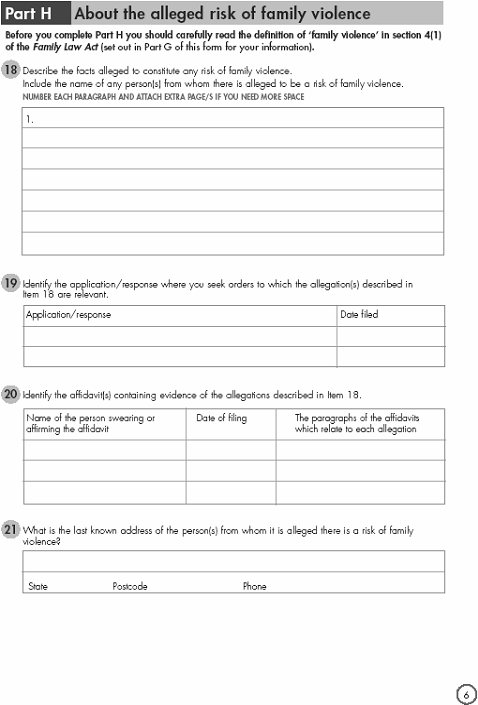

[57] Schedule 2, Forms 10 to 12
substitute



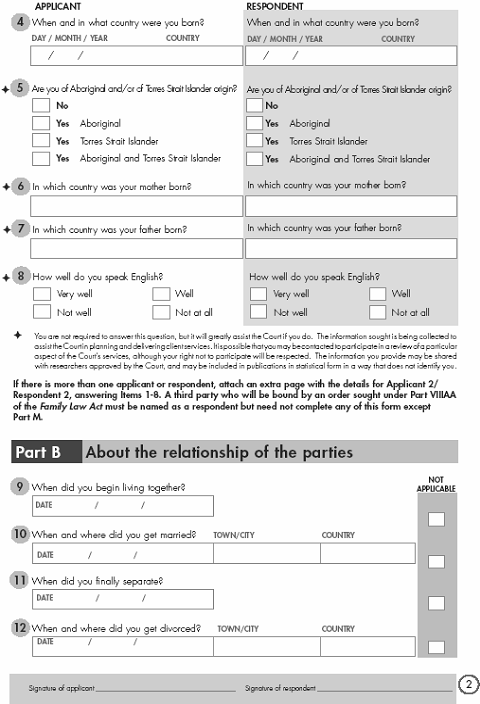






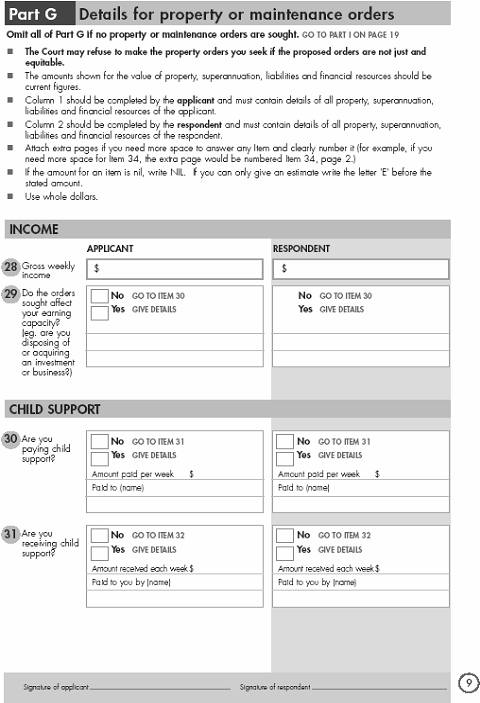





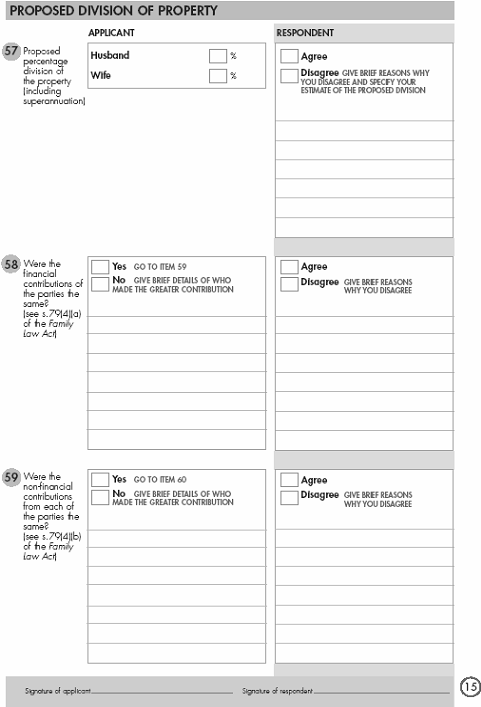

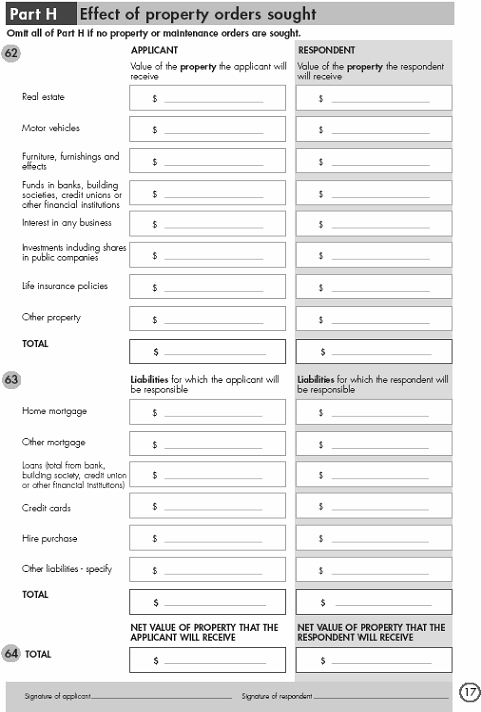
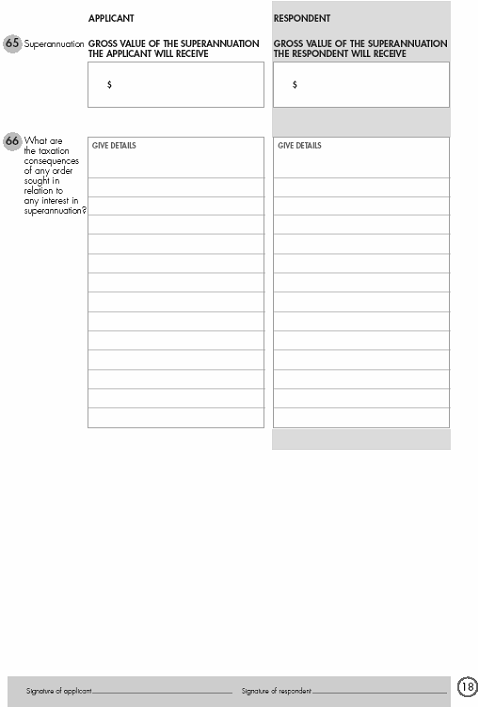

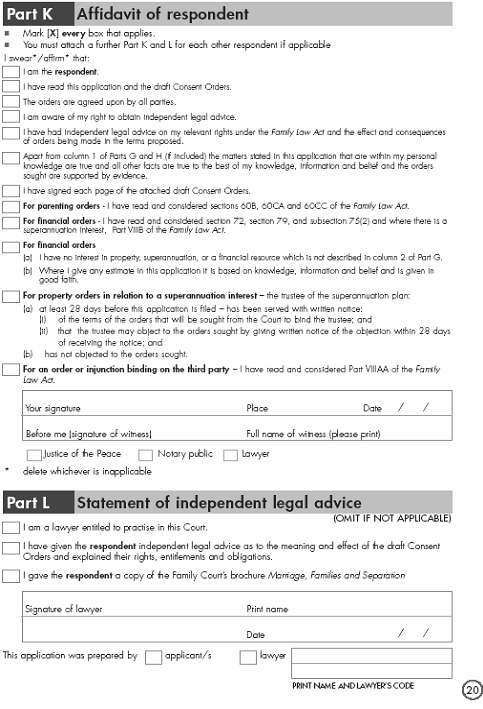

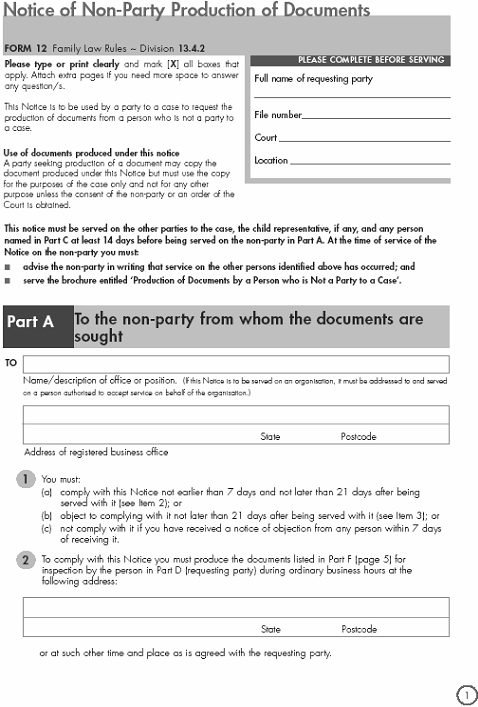






[58] Schedule 2, Form 14
substitute



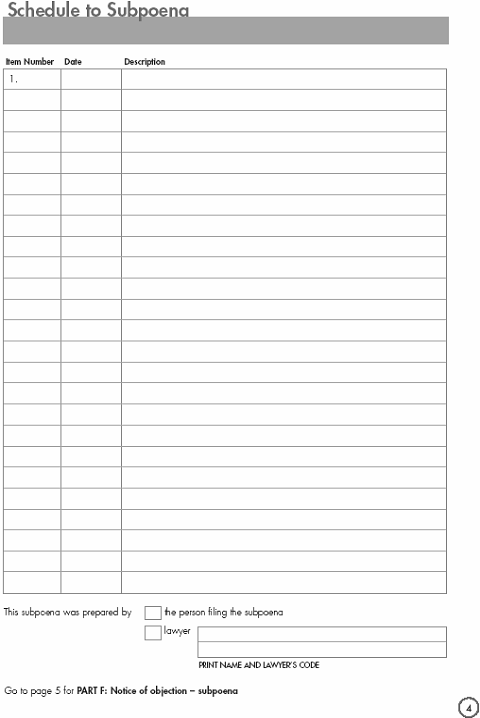

[59] Schedule 2, Form 18
substitute

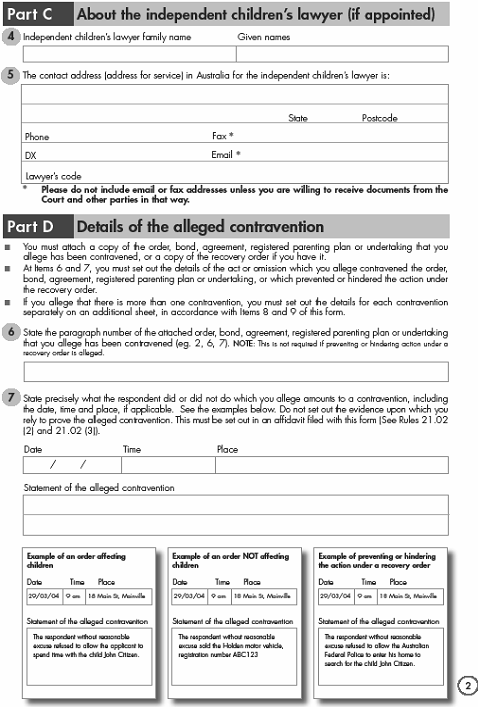
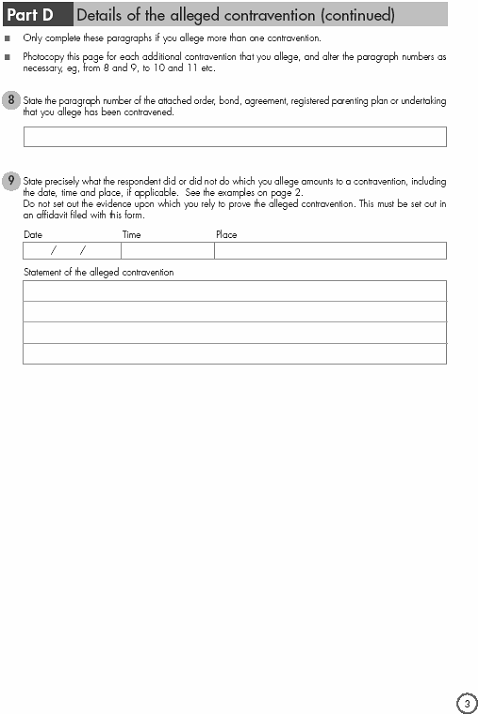


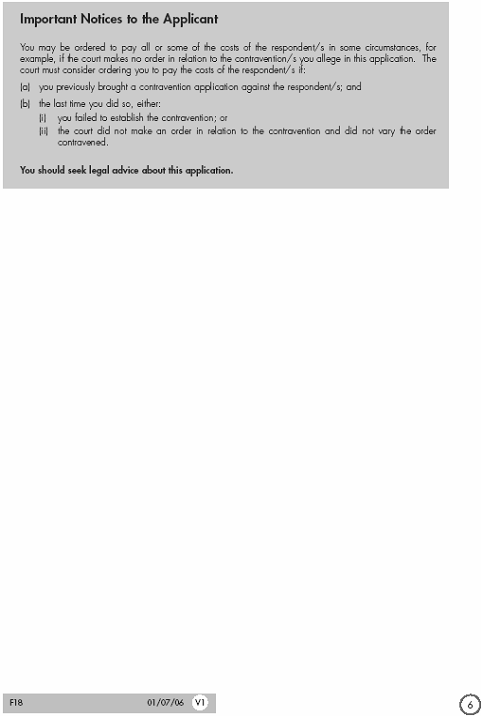
[60] Schedule 2, Form 20
substitute

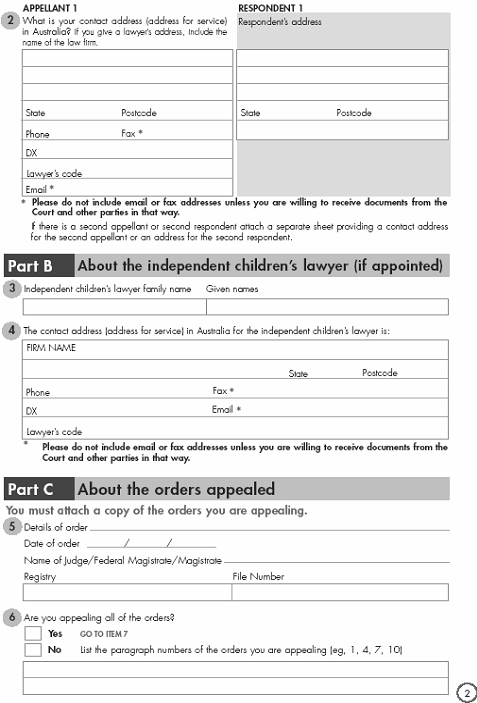


[61] Dictionary, definition of abuse
omit
subsection 60D (1)
insert
subsection 4 (1)
[62] Dictionary, definition of child representative
substitute
child‑related proceedings has the meaning given by subsection 4 (1) of the Act.
[63] Dictionary, definition of contravened
omit
section 70NC
insert
subsection 4 (1)
[64] Dictionary, definition of court event
omit
or mediation.
insert
or family dispute resolution.
[65] Dictionary, after definition of expense
insert
family consultant has the meaning given by subsection 4 (1) of the Act.
family counselling has the meaning given by subsection 4 (1) of the Act.
family counsellor has the meaning given by subsection 4 (1) of the Act.
[66] Dictionary, after definition of Family Court
insert
family dispute resolution has the meaning given by subsection 4 (1) of the Act.
family dispute resolution practitioner has the meaning given by subsection 4 (1) of the Act.
[67] Dictionary, definition of family report
omit
subsection 55A (2), or section 62G or 65G, of the Act
insert
subsection 55A (2) or section 62G of the Act
[68] Dictionary, definitions of family violence and family violence order
omit
section 60D
insert
subsection 4 (1)
[69] Dictionary, definition of final resolution event , paragraph (b)
substitute
(b) for a parenting case -- the final court event in the resolution phase.
[70] Dictionary, after definition of financial case
insert
financial matters has the meaning given by subsection 4 (1) of the Act.
[71] Dictionary, after definition of holding period
insert
independent children's lawyer has the meaning given by subsection 4 (1) of the Act.
[72] Dictionary, definition of lawyer , except the note
substitute
lawyer means a person who is enrolled as a legal practitioner of:
(a) a federal court; or
(b) the Supreme Court of a State or Territory.
[73] Dictionary, definition of mediator
omit
[74] Dictionary, before definition of parenting case
insert
overseas child order has the meaning given by subsection 4 (1) of the Act.
[75] Dictionary, definition of post‑separation parenting program
omit
section 70NB
insert
subsection 4 (1)
[76] Dictionary, definition of prescribed child welfare authority
omit
subsection 60D (1)
insert
subsection 4 (1)
[77] Dictionary, definition of primary dispute resolution method
omit
[78] Dictionary, definition of primary order
omit
section 70NB
insert
subsection 4 (1)
[79] Dictionary, definition of recovery order
omit
section 67Q
insert
subsection 4 (1)
[80] Dictionary, after definition of Registration Act
insert
Registry Manager has the meaning given by subsection 4 (1) of the Act.
[81] Dictionary, definition of State child order
omit
section 70B
insert
subsection 4 (1)
[82] Dictionary, definition of step‑parent
omit
subsection 60D (1)
insert
subsection 4 (1)
[83] Further amendments
|
Provision |
omit each mention of |
insert |
|
Subrule 1.05 (1) |
primary dispute resolution |
dispute resolution |
|
Paragraph 1.06 (a) |
primary dispute resolution |
dispute resolution |
|
Paragraph 4.08 (1) (d) |
child representative; |
independent children's lawyer; |
|
Paragraph 5.04 (4) (a) |
a child representative; |
an independent children's lawyer; |
|
Paragraph 5.08 (e) |
primary dispute resolution |
dispute resolution |
|
Rule 6.12 |
child representative |
independent children's lawyer |
|
Subrule 7.04 (3) |
child representative. |
independent children's lawyer. |
|
Subrule 7.04 (4), definition of each person to be served , paragraph (b) |
child representative; |
independent children's lawyer; |
|
Paragraph 13.08 (1) (a) |
child representative; |
independent children's lawyer; |
|
Paragraph 13.08 (1) (b) |
child representative. |
independent children's lawyer. |
|
Subrule 13.15 (1) |
(except a child representative) |
(except an independent children's lawyer) |
|
Subparagraph 13.15 (1) (a) (ii) |
(including any child representative) |
(including any independent children's lawyer) |
|
Subrule 13.15 (4), form of notice, paragraph (b) |
(including any child representative) |
(including any independent children's lawyer) |
|
Rule 13.32, definition of non‑party |
or a child representative in, |
or an independent children's lawyer in, |
|
Paragraph 15.03 (5) (a) |
a child representative; |
an independent children's lawyer; |
|
Subrule 15.21 (2) |
A child representative |
An independent children's lawyer |
|
Paragraph 15.28 (1) (b) |
child representative |
independent children's lawyer |
|
Paragraph 15.31 (2) (d) |
child representative. |
independent children's lawyer. |
|
Subrule 15.31 (3) |
child representative's |
independent children's lawyer's |
|
Subrule 15.39 (2) |
child representative. |
independent children's lawyer. |
|
Subrule 15.51 (2) |
A child representative |
An independent children's lawyer |
|
Rule 15.58 |
child representative |
independent children's lawyer |
|
Subrule 16.06 (1) |
child representative |
independent children's lawyer |
|
Subrule 16.06 (2) |
a child representative |
an independent children's lawyer |
|
Subrule 16.07 (1) |
a child representative |
an independent children's lawyer |
|
Subrule 16.07 (2) |
A child representative |
An independent children's lawyer |
|
Subrule 18.06 (2), Table 18.5, item 9, column 3 |
a child representative |
an independent children's lawyer |
|
a child representative |
an independent children's lawyer |
|
|
Subrule 19.04 (4) |
the child representative |
the independent children's lawyer |
|
Subrule 22.05 (2), definition of each person to be served |
child representative |
independent children's lawyer |
|
Rule 22.07 |
a child representative |
an independent children's lawyer |
|
Subrule 22.17 (2) |
A child representative |
An independent children's lawyer |
|
Paragraph 22.26 (1) (c) |
child representative -- |
independent children's lawyer -- |
|
Rule 22.43, note 2 |
child representative |
independent children's lawyer |
|
a child representative |
an independent children's lawyer |
|
|
Subparagraph 24.01 (1) (g) (iii) |
child representative |
independent children's lawyer |
|
Paragraph 24.13 (1) (b) |
a child representative, |
an independent children's lawyer, |
|
Schedule 1, Part 1, paragraph 1 (1) (a) |
primary dispute resolution, |
dispute resolution, |
|
Schedule 1, Part 1, paragraph 3 (1) (b) |
primary dispute resolution |
dispute resolution |
|
Schedule 1, Part 1, paragraph 3 (1) (c) |
primary dispute resolution |
dispute resolution |
|
Schedule 1, Part 1, paragraph 3 (2) (a) |
primary dispute resolution |
dispute resolution |
|
Schedule 1, Part 1, paragraph 3 (2) (b) |
primary dispute resolution. |
dispute resolution. |
|
Schedule 1, Part 1, paragraph 3 (4) (a) |
primary dispute resolution |
dispute resolution |
|
Schedule 1, Part 1, paragraph 3 (4) (b) |
primary dispute resolution; |
dispute resolution; |
|
Schedule 1, Part 1, paragraph 3 (4) (c) |
primary dispute resolution. |
dispute resolution. |
|
Schedule 1, Part 1, subparagraph 6 (1) (h) (i) |
primary dispute resolution |
dispute resolution |
|
Schedule 1, Part 2, paragraph 1 (1) (a) |
primary dispute resolution, |
dispute resolution, |
|
Schedule 1, Part 2, paragraph 3 (1) (b) |
primary dispute resolution |
dispute resolution |
|
Schedule 1, Part 2, paragraph 3 (1) (c) |
primary dispute resolution |
dispute resolution |
|
Schedule 1, Part 2, paragraph 3 (2) (a) |
primary dispute resolution |
dispute resolution |
|
Schedule 1, Part 2, paragraph 3 (2) (b) |
primary dispute resolution. |
dispute resolution. |
|
primary dispute resolution |
dispute resolution |
|
|
Schedule 1, Part 2, paragraph 3 (4) (b) |
primary dispute resolution; |
dispute resolution; |
|
Schedule 1, Part 2, paragraph 3 (4) (c) |
primary dispute resolution. |
dispute resolution. |
|
Schedule 1, Part 2, subparagraph 6 (1) (h) (i) |
primary dispute resolution |
dispute resolution |